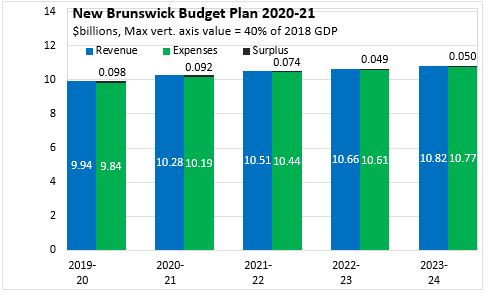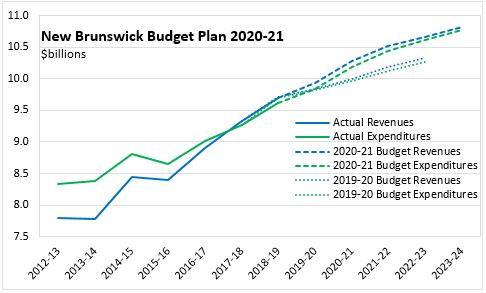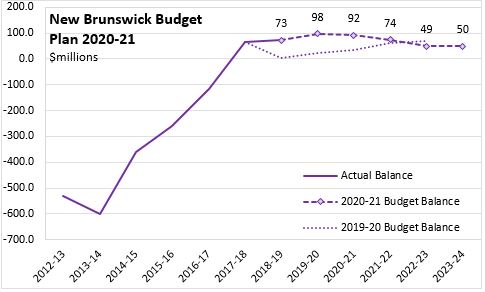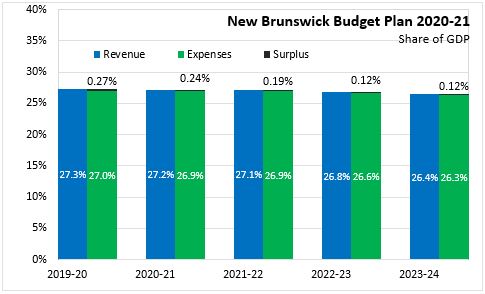The Economics and Statistics Division maintains archives of previous publications for accountability purposes, but makes no updates to keep these documents current with the latest data revisions from Statistics Canada. As a result, information in older documents may not be accurate. Please exercise caution when referring to older documents. For the latest information and historical data, please contact the individual listed to the right.
<--- Return to Archive
For additional information relating to this article, please contact:
March 10, 2020NEW BRUNSWICK BUDGET 2020-21 The government of New Brunswick has released its 2020-21 Budget, anticipating a surplus of $92 million for the current fiscal year and surpluses in each of the next three fiscal years. Between 2019-20 and 2023-24, New Brunswick's revenues and expenditures are each projected to grow by 2.8 per cent.

Compared with the fiscal plan presented in the 2019-20 Budget, New Brunswick's revenues are higher and expenditure plans have been adjusted up to maintain similar levels of surplus over the four year planning horizon.

New Brunswick's planned surpluses are higher than anticipated in 2019-20 and 2020-21 and consistent with previous plans for 2021-22 and beyond.

The New Brunswick government's footprint in the economy (measuring revenues and expenditures as a share of GDP) is projected decline in the coming fiscal years. Revenues are projected to decrease from 27.3 per cent of GDP in 2019-20 to 27.2 per cent of GDP in 2020-21 and eventually falling to 26.4 per cent by 2023-24. Expenditures are projected to decline from 27.0 per cent of GDP in 2019-20 to 26.9 per cent in each of the next two fiscal and then declining to 26.3 per cent by 2023-24.
New Brunswick's surpluses are projected between 0.12 and 0.24 per cent of GDP in each of the next four fiscal years, down from 0.27 per cent of GDP forecast for 2019-20.
New Brunswick's debt-to-GDP ratio is projected to fall from 34.7 per cent in 2020-21 to 34.0 per cent in 2021-22, to 33.0 per cent in 2022-23 and to 32.0 per cent in 2023-24.

New Brunswick's economic outlook is stronger in nominal terms than projected during the last Budget, but the outlook for real GDP growth is little changed. New Brunswick's economy (real GDP) is projected to rise by 1.2 per cent in 2020 followed by 0.6 per cent growth in 2021. Nominal GDP is projected to rise by 3.7 per cent in 2020 and by 2.6 per cent in 2021. The outlook incorporates robust gains in immigration, which supports rising labour force and employment. Mining, agriculture and manufacturing activities are all projected to increase in the near term as trade tensions abate. The outlook does not incorporate some major projects such as Maritime Iron project and Mactaquac Dam restoration and these constitute upside risks to the outlook. The outlook anticipates that the emergence of coronavirus will not have a significant impact on real GDP in New Brunswick, but this could pose a short-term downside risk to the forecast.

Key Measures and Initiatives
With continued stability in public finances, the New Brunswick Budget for 2020-21 prioritizes:
- Health initiatives such as: expanded vaccination programs, an immunization registry, renewal/modernization of TeleCare 811, added ambulances for patient transport, new surgical suites, added oncology drug funding, a nursing resource strategy, a nurse practitioner training incentive, greater funding for mental health and addictions services.
- Higher rates and indexing for social assistance payments
- Education improvements, including: more teachers, support for inclusive learning and education assistants, pilot school food programs, prototypes for new approaches to learning French as a second language, increased wages for early childhood educators
- Reduced property taxes for residential non-owner-occupied housing and non-residential properties
New Brunswick Budget 2020-21
<--- Return to Archive